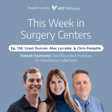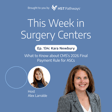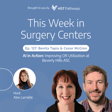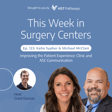Introduction to ASC Podcast
00:00:01
Speaker
Welcome to This Week in Surgery Centers. If you're in the ASC industry, then you're in the right place. Every week, we'll start the episode off by sharing an interesting conversation we had with our featured guest.
00:00:12
Speaker
And then we'll close the episode by recapping the latest news impacting surgery centers. We're excited to share with you what we have. So let's get started and see what the industry's been up to.
00:00:27
Speaker
everyone, here's what you can expect on today's episode.
ASC Leader Expectations for 2025
00:00:31
Speaker
Today we are diving into the latest insights from VMG Health's newly released report, ASC Leader Expectations for 2025. This report is based on a survey of 137 ASC leaders, including admin, CEOs, VPs, and clinical directors from both independent and joint venture centers.
00:00:51
Speaker
To break down the key takeaways, our host Nick Latz sat down with Colin Park, who is the managing director at VMG Health. Together, they explore what ASC leaders are prioritizing for the year ahead and what trends Colin and his team uncovered.
00:01:05
Speaker
After our conversation with Colin, we'll switch to our data and insights segment. HST released our annual State of the Industry report in September, which analyzed client data from 590 surgery centers.
Operational Impacts of Delayed Surgeries
00:01:17
Speaker
Today, we'll spend a few minutes breaking down on-time starts. We'll look at which specialties have the longest delays, which have the shortest, and the operational impacts of starting surgeries late. Hope everyone enjoys the episode, and here's what's going on this week in Surgery Centers.
00:01:36
Speaker
um Welcome to the show. Thank you. Good to be here.
VMG Health's Inaugural ASC Survey
00:01:41
Speaker
Colin, excited to dig into the VMG 2025 ASC leader expectation survey today.
00:01:48
Speaker
Can you share what this survey is all about? How long you guys have been doing it and what ultimately you're trying to uncover? Yeah, yeah. So we've done a survey similar to this for hospitals, health system, sub-industry over the last few years. So we thought this would be something that would be pretty interesting to do for the ASC market.
00:02:09
Speaker
So this was actually our first year to do this survey. We wanted to capture a broad array of individuals with which to reach out to to get feedback on. So we have We have individuals that are admins at independent surgery centers. We have folks that are work and development teams, or they may be market presidents, regional vice presidents of larger management companies, some folks from hospitals, health systems that have outpatient strategies, and then even some PE groups that have ASC strategies. So I think
00:02:45
Speaker
In all, we had close to about 150 total respondents, geographically pretty diverse. Yeah, it was our first year to do this, so we were pretty excited to just get everyone's perspective on what the expectations are for 2025 for the ASC market.
00:03:02
Speaker
Congrats on getting the first one published. It feels like the first one is always the hardest one. It's a ah bunch of great information as we'll get into, so hopefully this becomes an annual trend. What's the response been so far from the industry?
00:03:14
Speaker
Yeah, it's been well received. I definitely think that we will certainly do this every year going forward. I think it provides some good insight. So we will continue to build on it, but definitely well received and one of our more downloaded items from our website.
Key Insights from ASC Survey
00:03:30
Speaker
Fantastic. So digging into the survey and the report at a high level, what are some of the interesting trends that popped out from the survey? Yeah, i would say high level just on the revenue side, which is probably the more obvious item is just physician recruitment, retainment of top talent.
00:03:49
Speaker
On the expense side, the big things that came up were just labor, shortages, labor costs, supply costs. And I think there was some pretty varying levels. And different outlooks as far as transaction activity. I think part of that was just driven by the broad array of individuals we spoke with.
00:04:05
Speaker
So I think different outlooks on trans transaction transaction activity as well as strategic partnerships. Great. And on the revenue side, you talked about physician recruitment, which which is obviously a big driver.
00:04:21
Speaker
you touched on retention too. And I saw a stat in in your survey that said, 40% of respondents listed both the recruitment side and the retention side is is something that would be a challenge going into 2025.
00:04:37
Speaker
Did you see any color or do you guys have any hypotheses around the retention side of ah physicians and and what kind of the struggles and challenges are potentially there? Yeah, I think they quasi go hand in hand on one One component is just aging physician-based, so you don't have as many younger physicians coming into the market as you do um you know retiring and leaving the market. So you've got that.
00:05:01
Speaker
I think there's just a lot of competing opportunities for physicians. I think you've got competing ASCs, one. You've got competing practices. You've got private equity is now becoming pretty heavily involved, and so they're trying to roll up physician practices under their umbrella and plug them into their surgery centers, and then you've got hospitals and health systems that are in the last few years pretty active in employing specialized physicians. And so you've just got a lot of competing interests for physicians that I think they have a lot of different opportunities to choose from. So I think that's leading to difficulty with recruiting new physicians and keeping those really, really good physicians in their centers.
00:05:48
Speaker
Certainly. And you touched on transaction activity too. And one of the stats you had, I thought was super interesting. I haven't seen a stat like this yet is, think it was 84% of independent ASCs were not planning a sale activity, at least in 2025. And think that's an interesting dynamic when you've got groups, whether it's management companies or private equity equity or health systems that have a strategy of rolling up.
00:06:15
Speaker
independence and are planning on doing it in 25. And so I think that's an interesting dynamic. I think that'll be one. It'll be super fascinating to see if that's consistent from year to year as you guys continue to do this, you know, survey or if it varies from year to year depending on market dynamics.
00:06:30
Speaker
Yeah, no, I agreed. That statistic was interesting to see because it was, there was another one that talked about strategic partnerships that almost was against that statistic. It seemed like independent centers weren't interested in completely selling their business or selling in a large chunk of ownership, but they were and interested in maybe bringing on a strategic partner.
00:06:52
Speaker
Yep. Yep. Yep. Great. Drilling in on financial challenges. How about the financial
Financial Challenges Post-COVID
00:07:01
Speaker
challenges? What did ASC say that they're struggling with right now as it relates to financial challenges?
00:07:06
Speaker
Yeah, I think most all that was brought up was on the expense side or largely on the expense side of the equation. so I think the biggest... One of the biggest ones is anesthesia.
00:07:17
Speaker
Years ago, anesthesia is something that in the ASC space we really never discussed. i did I do valuations, fair market value opinions for surgery centers, and that was a line item that I just never saw in the ASC financials. And then a couple of years ago, it started to be seen in different markets and whatnot.
00:07:36
Speaker
Now you go to any surgery center conference and it's one of the most best things there. And so I would say anesthesia stipends are are hitting centers pretty hard. And the unfortunate part of it, I would say, is that those centers that historically five years ago, they may have been profitable, but lowly profitable. So maybe hundred a few hundred K of EBITDA a year, consistent, but not just knocking out of the park.
00:08:03
Speaker
Those seem to be the centers that are getting hit the hardest and most consistently with these anesthesia stipends. And it's a function of just not having the volume or the case mix to prevent having to pay that stipend to the anesthesiologists and anesthesia groups.
00:08:19
Speaker
So I'd say that's number one. Number two, drugs and medical supplies. I would say the growth in those costs over the last year, they've just consistently outpaced reimbursement growth and drugs and medical supplies continue to rise.
00:08:33
Speaker
But think the other big expense would be on the labor side. yeah Everyone saw COVID timeframe, like contract labor just went through the roof. I'd say we're starting to see that tail off market dependent. Most markets, though, we're seeing decrease in contract labor. But what you also saw through COVID was just salaries and hourly rates just went really high and they went through. the That hadn't receded. And so it's climbed steadily. it It jumped up sharply and it's continued to climb. It hasn't receded. And so if you look at a center today versus a couple of years ago, your labor costs as a percentage of revenues is significantly higher.
00:09:11
Speaker
than it was and it it hadn't come down and I don't anticipate it it'll come back down anytime soon. but then I think lastly, just capital investment for aging facilities that are needing to make significant capital investment and in their facility construction costs and and whatnot. It's not cheap now and major capital items are are pretty expensive currently and expected to continue to be.
Strategic Partnerships for ASCs
00:09:35
Speaker
chair Sure, sure.
00:09:36
Speaker
Okay. Colin, I want to circle back to one of the points that you made around, hey, ASCs aren't looking to sell their business outright, but are open to strategic partnerships.
00:09:47
Speaker
And I think you guys asked a question specifically around that in terms of, hey, what kinds of partnerships or partners would you consider? What did the data show there? Yeah, I think, and it depends upon what they want out of a partnership. And so do they need help with reimbursement, do they need help with recruiting? And so what we typically see is a management type entity that has some ownership, but takes an active role in management. So they're able to help on both the revenue and expense side. So they're able to help with managed care negotiations and helping with getting better contracts, yeah able to streamline on the expense side, whether it's through helping with billing collections and
00:10:36
Speaker
contract expenses and whatnot. And so I think that's primarily what they were looking at from a perspective of a strategic partner. Got it. It looks like there's a couple other groups there listed too, in terms of health systems and and private equity. Would you assume on the health system side, it's largely around physician recruitment and access to physician physicians and and case referrals? so yeah Yeah, I think on the health system side, a lot of health systems are starting to see the writing on the wall. So they're seeing that you're going to start to have volume decant from the hospital. And so it's, if they're going to lose some this volume that's historically been done in the hospital, why not try and capture that? And so
00:11:19
Speaker
For those health systems that historically may not have had and outpatient strategy, they're starting to really think about what they can do to have that. And so on one hand, hospital or health system can start from scratch, or they can go and look at an established ASC in the market, and so they can hit the ground running effectively. Also, health systems hospitals that may have historically had a HOPD or hospital outpatient department can think that or they may want to ah strategically align with physicians in the market. So it could be a matter of converting that HOPD to a freestanding facility. And by doing so, they're allowing them to bring in physicians and invest in that center. So they're able to syndicate with physicians, which helps with that alignment with that group.
00:12:05
Speaker
And so that's what I see a lot on the hospital side. And then with private equity, at the very beginning of private equity involvement, we really didn't see much direct investment from PE into surgery centers. was more on the clinical side. Private equity may align with the GI practice that also has an ASC. And so they'll become heavily involved in the practice side and then maybe tangentially have some ownership in the ASC. But I would say over the last few years, we're seeing much more investment and directly through different platforms.
00:12:42
Speaker
And I think that's just going to continue grow. And I think that just speaks to the ASC industry and that it's highly regarded amongst private equity groups that that they want to become involved. And so we're probably going to see that to continue to grow. Great.
00:12:56
Speaker
Okay. Wanted to circle back as well to anesthesia, which you talked about in terms of key trends of of challenges and struggles.
00:13:07
Speaker
What models, I know you guys asked the question about what models are most prevalent from an anesthesia perspective.
Anesthesia Models and RN Sedation Programs
00:13:12
Speaker
What did the data show there? Yeah, we see some employment type arrangements where you may have a center that employs the CRNAs and anesthesiologists.
00:13:26
Speaker
Don't see that too frequently, but certainly do see it in some markets. um I would say by far, clear in a way, the biggest that we see is just contracted with the independent group and two different structures. For some centers and a larger market that has either a really good case mix or a really good payer mix, there it's fantastic center. Anesthesiologists want to work for that center. They want to and provide coverage for that center.
00:13:55
Speaker
Conversely, if you have a center that isn't necessarily able to fill the block time, they're they're not able to set case on case, or they have and not desirable, that's where you get into the territory of that group requiring like a stipend or a minimum that they must meet. and so that those two the similar structure it's just a ah function of does the center have to pay a stipend or not so that's by far in a way what we see the most and i would say that's something that's a little bit newer i i'm hearing more about i haven't seen it personally too much but i think it's going to become a little bit more prevalent would be um rn conscious sedation type programs that's obviously going to be
00:14:39
Speaker
dependent upon these types of cases. You're not going to necessarily be doing that for very high acuity type procedures, but maybe more on like the ophthalmology types. While I don't think it's super prevalent now, I think it's something that may be explored more and more as anesthesia, cRNA labor costs are continuing to climb. So it's getting more and more expensive. So I think alternatives like RN conscious station programs are going to be explored more and more.
00:15:06
Speaker
Yeah, yeah. And not surprising to see the, yeah i think if we trended this survey, we'd see that the stipends are on the rise, either supply and demand dynamics. And I think to your earlier point, that really hurts the lower volume.
00:15:21
Speaker
centers that you know that your point are break even or profitable but not highly profitable yet because haven't scaled case volume and those lower levels of volume that those stipends can really eat into that profitability yeah absolutely and i think that's where we see a lot of those centers are the centers that are looking for a strategic partner they're in a way looking for a lifeline because they see the writing on the wall that while five years ago they have been consistently profitable but You get hit with an anesthesia stipend, your labor costs are going up, you ultimately see where that's going to lead.
00:15:58
Speaker
And that's where the strategic partner is able to come in and they're able to potentially help provide some lift on the the revenue side or they can help with bringing in new physicians or help on the expense side with being able to leverage negotiations with suppliers and whatnot. So i think that's where we see a lot of the strategic discussions coming in and bringing in a strategic partner for those centers that may be on the verge of really starting to struggle.
00:16:26
Speaker
Colin, final question for you. We do this each week with our guests. What's one thing our listeners can do this week to improve their surgery centers? Yeah, myself, I'm not involved on the operational side of ASCs, but more the transactional side. So I'll say this, I'll speak more to kind of those centers that I was just talking about that the centers that may be in the market that are independent, that may be looking at a strategic partner or potentially selling some ownership.
00:16:53
Speaker
I would first, decide what you want out of a partnership. Do you want help? yeah is Is your center currently being managed by physicians and those physicians just want to be physicians and they don't want to manage the business anymore? So do you want to shoot strategic partner to help with managing the day-to-day operations? Do you want help with managed care contracting? do you want help with staffing or billing and collection? So would say first and foremost, decide what you want to get out of a partnership before you start going down the path of getting a partner.
00:17:25
Speaker
Now, secondly, I would say most important, you know get your house in order. So get your financials cleaned up, get a really good grasp on the economics of the center. Look at your cap table. Does your cap table need to be cleaned up? Do you have a bunch of positions that have ownership that have retired or have relocated or maybe violating one third from a violation perspective?
Preparing for Strategic Partnerships
00:17:46
Speaker
clean up your cap table, basically get all your financials together and and really be able to tell your story or the story of your center to potential suitors. And so i think those are the two biggest things is just first decide what you want from a potential partner and then just having everything in order and ready to go to where once you start moving towards potential, she's your partnership, everything's ready to go in TDOT.
00:18:12
Speaker
Fantastic. Colin, thanks so much for joining us today. Yeah, absolutely. i appreciate it.
00:18:20
Speaker
HST Pathways released an updated version of our State of the Industry report in September, highlighting best practices, key process steps, and KPIs for every step of the patient journey and for nearly every recurring administrative duty.
00:18:32
Speaker
Most importantly, using our own unique data set from our clients, we were able to extract data points so that anyone in the industry could benchmark themselves against their peers. Two disclaimers, we only pulled data from clients who gave us permission, and we omitted any extreme outliers.
00:18:48
Speaker
So today we're going to take a look at on-time starts.
Enhancing On-Time Starts in ASCs
00:18:51
Speaker
On average, surgeries are delayed 15.4 minutes. We broke this metric down by specialty and here are a few call-outs.
00:19:00
Speaker
Performing the worst was general surgeries. So that had an average of a 27.2 minute delay. And then performing the best was ENT with an average delay of only 8.1 minutes.
00:19:14
Speaker
And in the middle, just to call out a few of the most popular specialties, GI i averaged 15.7 minutes, ophthalmology averaged 15.1, and orthopedics averaged 13 minutes.
00:19:28
Speaker
But overall, let's focus on the average of all specialties, which again was a 15.4 minute delay. While this might not feel significant, delays can cause chaos in an ASC.
00:19:39
Speaker
When surgeries are delayed, it can compound over the course of the day, which can decrease OR utilization, have a negative impact on patient satisfaction, and rack up overtime costs for staff.
00:19:51
Speaker
And obviously, there are a ton of factors that go into getting a case to start on time. This could be the patient's doing or the surgery center's doing, but let's just focus on what the center can do to improve.
00:20:03
Speaker
The first, consider creating an incentive program for punctuality. Whether it's tied to bonuses, recognition programs, or even awarding departments for the most on-time starts, incentivizing the team can create a culture of accountability.
00:20:18
Speaker
The second, streamline your pre-op process as much as possible. Delays often originate from inefficiency. So this can be caused by incomplete patient prep, missing documentation, or equipment not being ready.
00:20:32
Speaker
You can also focus on automating parts of the pre-op workflow, such as patient clearance and documentation checks, which can help minimize manual errors that will slow down the start of surgery.
00:20:44
Speaker
The third, monitor on-time start metrics as closely as you can. Tracking these metrics is critical for identifying patterns in delays, which will then help you identify solutions.
00:20:55
Speaker
So whether it's specific surgeons, procedures, or time slots that constantly run late, having that information will allow you to put a plan in place. And then one thing that has been extremely effective in terms of mitigating damage done by delays, think about implementing a first case on time start policy if you have not already.
00:21:15
Speaker
The first surgery of the day sets the tone. So if the first case starts late, it creates a ripple effect of delays for the entire schedule. I've also heard from facilities who will not perform the first procedure of the day if it's starting more than 15 minutes late, just because that ripple effect can be so harmful.
00:21:33
Speaker
Just make sure you hold all team members accountable from the OR staff to the surgeons for being ready on time and get everybody involved to come up with ideas and get involved in the process of trying to improve this metric.
00:21:47
Speaker
If you do want to see the average on-time starts for all 12 specialties, or if you're interested in more data points and use cases, head to our website to check out the full State of the Industry Report to get your hands on even more data.
00:22:01
Speaker
And that officially wraps up this week's podcast. Thank you, as always, for spending a few minutes of your week with us. Make sure to subscribe or leave a review on whichever platform you're listening from.
00:22:11
Speaker
ah hope you have a great day, and we will see you again next week.




















